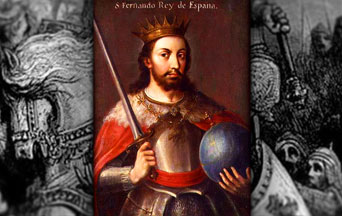
Saint Ferdinand III, King of Castile and Leon, Spain, loved the Catholic Church entirely, lived for God’s greater glory and fought for the salvation of Christendom. He is a role model that demonstrates not only the perfection of a Catholic man but that piety and purity go hand in hand with militancy against the enemies of God.
This captivating story of this truly Catholic king came to life in Sister Maria Del Carmen Fernández de Castro Cabeza’s 1988 book titled The Life of the Very Noble King of Castile and Leon, Saint Ferdinand III. In only 280 pages, this Spanish nun recounts a fifty-year-long epic that began in 1201. Sister Maria researched from abundant sources to create this magnificent book.
Born of the marriage between Berenguela of Castile and Alfonso IX of Leon in 1201, nothing but internal and external crosses awaited Saint Ferdinand III. Very early on in his life, his parents’ marriage was annulled due to consanguinity. The life at court around him was very immoral, and from an early age, he vowed to remain pure. This great virtue was so precious to him that he only accepted marriage in deference to his mother’s wishes.
Because of his expert leadership and devotion to Our Lady, Saint Ferdinand united the two kingdoms of Castile and Leon upon his father’s death in 1230. With the combined strength of these great kingdoms, Saint Ferdinand began a reconquest of Spain from Muslim power. Saint Ferdinand’s crusade retook massive portions of Spain, including the major cities of Cordoba, Jaen, and Seville. Only Granada remained unconquered, although it became his vassal.
After securing Spain in 1252, God called His most dedicated crusader home. Even his death was extraordinary, as he spent his last strength receiving the Sacraments and kneeling before God.
One of the greatest heresies today claims that a man cannot be pious and pure while retaining his masculinity. King Saint Ferdinand III of Castile and Leon destroys this false idea. He knew he would have to overcome impurity if he was to fulfill his role. His complete purity of thought and action gave him absolute confidence and convictions. With this confidence in Our Lady’s intercession, he never vacillated or lost a battle.
As a Catholic, he knew that all life should be lived for the greater glory of God. Thus, he did nothing for himself and all for God, the Blessed Mother and the Church. This book shows that if a man wants to reach the apex of Catholic masculinity, he only needs to follow Saint Ferdinand’s supreme example, and he will reach it in the end.
Saint Ferdinand, Pray for us.
